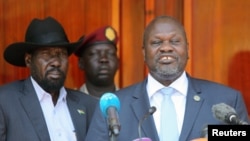After more than six years of civil war, the warring parties in South Sudan agreed in late February to form a Transitional Government of National Unity. This is a long-delayed, but necessary step toward ending a conflict that has left some 400,000 people dead and well over 4 million others displaced inside and outside of the country.
South Sudan is a fragile state that is struggling with several challenges. Chief among them are a serious shortage of food that has pushed more than 9 million people into food insecurity and a sharp spike in the number of COVID-19 cases that has overwhelmed the country’s health care system, one of the weakest in the world. To add to these problems, the parties to the February agreement are struggling to agree on solutions, and the political impasse could be costly.
According to Caroline Sekyewa, South Sudan Country Director at the International Rescue Committee, “community violence is raging in several states where the government is unwilling and unable to exercise political and administrative control. The political standoff is preventing the formation of critical institutions, including the appointment of state leadership required to lead a COVID-19 response at the local level.”
The key to begin fixing South Sudan’s problems is political stability, and the key to political stability is strong, democratic governance.
On June 9, the governments of the United States, the United Kingdom, and Norway -- also known as the Troika -- issued a statement urging South Sudan’s fledgling Transitional Government of National Unity to take the next step and fill vacant positions in local and state governments.
The Troika noted that the increasing violence is causing immense suffering for the people of South Sudan. It hinders humanitarian access to those most in need and impedes the country’s COVID-19 response.
“Now is the moment for the President and Vice Presidents, supported by the Intergovernmental Authority on Development and the guarantors of the peace agreement, to agree on the selection of governors and to move forward to govern together for the benefit of the people of South Sudan,” said the Troika in a statement. “Any further delay creates uncertainty that undermines the transition process, slows the fight against COVID-19, and holds back efforts to end the violence that now threatens the hard-won peace.”
On June 17, the parties reached agreement on the selection of state governors. While this is good news, there remains an urgent need for follow-through and continued statesmanship by all sides.






